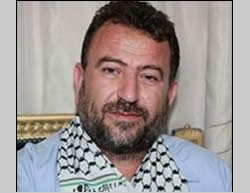Where’s the Coverage? Hamas Visits Iran

Top leaders from Hamas, the U.S.-designated terror group that rules the Gaza Strip, visited the Islamic Republic of Iran, in late October 2017. Hamas is currently engaged in reconciliation talks with its rival Fatah, which dominates the U.S. and E.U.-supported Palestinian Authority (PA).
Many major U.S. media outlets ignored Hamas’s Iran trip—which was blasted by U.S. peace envoy Jason Greenblatt, who stated:
“Hamas, which has only brought ruin and misery to Palestinians, now begs Iran for help and again vows to destroy Israel.”
Indeed, in its report on the visit of Hamas officials, such as Saleh al-Arouri, The Times of Israel noted that the terror group’s decision to go to Iran violated Israel’s conditions for recognizing a Hamas-PA unity government (“Hamas leader’s visit to Iran defies Israel’s condition for Palestinian unity,” Oct. 23, 2017).
Israel has also requested that Hamas disarm and recognize the Jewish state. Hamas, however, has categorically rejected Israel’s preconditions. Al-Arouri openly admitted as much, exhorting to Iranian media that “Our presence in Iran is the practical denial of the third precondition—cutting ties with Iran.”
As CAMERA has highlighted, some analysts and policymakers have claimed that Hamas is becoming more “moderate.” Others have asserted that reconciliation talks between the Gaza-based terror group and Fatah—both of which have called for Israel’s destruction—somehow make peace with the Jewish state more likely (see, for example “Palestinian Official: Unity Deal Will Make Peace More Likely,” Oct. 19, 2017, Al-Jazeera).
The Washington Post, for example, ran a story that, if implicitly, indicated Hamas-Fatah reconciliation could make peace more likely and that the U.S. and Israel were wrong not to embrace it (“Trump envoy balks at Palestinian reconciliation, insisting Hamas must disarm”). That October 19 report—published a mere two days before al-Alouri’s Tehran visit—quoted several PA and Hamas officials, as well as an Israeli professor named Moshe Maoz, who asserted: “They [the U.S. and Israel] should look at the positive side of this arrangement. In a sense, it carries some promise, as it could be a good chance for Israel to negotiate with the entire Palestinian people.”
For its part, Tehran has been a long-time backer of Hamas. However, Iran’s support for Syrian dictator Bashar al-Assad caused fissures in the relationship since the beginning of the Syrian civil war in 2011. But now, “out of cash and isolated, Hamas is in search of backing from a major regional power, and is returning to Iran’s orbit,” according to terror analyst Yaakov Lappin (“Hamas Rejoins Iran’s Terrorist Axis,” Investigative Project on Terrorism, Oct. 26, 2017).
Lappin stated that the renewed relationship could result in Hamas benefitting from Iranian proxy Hezbollah in neighboring Lebanon, which is “now seeing the arrival of Hamas members who have set up a new command center.” The next possible step could be setting up “terror cells in the West Bank [Judea and Samaria].”
Cash will once again flow from the Islamic Republic to Hamas, as will weapons and the technical know-how required to use them. Indeed, according to analyst Grant Rumley of the Washington D.C.-based think tank, Foundation for the Defense of Democracies, Hamas now says that “they’ve doubled the range of their rockets since the 2014 war—[which] can now reach over 160km.”
Needless to say, this heightens the chance for another Israel-Hamas war. Unfortunately, this hasn’t translated into increased media coverage.
A Lexis-Nexis search, however, shows that major U.S. news outlets, such as The Washington Post, USA Today and The Baltimore Sun, among others, failed to report Iranian-Hamas reconciliation. Should another conflict erupt, many readers will be ill prepared. The Post’s failure to cover the story is particularly striking, as the paper ran a profile of al-Arouri on July 10, 2014— noting his role in sparking the last war (“The enigmatic Hamas leader allegedly behind the Israeli kidnappings that ignited the war”).
More from SNAPSHOTS
Mahmoud Abbas’ Diatribe Threatening Israel Included Bogus Canaanite Claim
September 10, 2019
Palestinian Authority President Mahmoud Abbas’ recent anti-Israel diatribe that aired on PA TV was monitored and translated by Palestinian Media Watch (PMW). Excerpt: "I say to [Israel]: Every stone you have built on our land [...]
CNN Calls House’s Unifying Anti-BDS Vote ‘Divisive’
July 24, 2019
Yesterday, in an overwhelming vote of bipartisan support, the House of Representatives voted 398 to 17 to adopt a resolution opposing the anti-Israel BDS (boycott, divest, sanctions) campaign. Yet, CNN's headline casts the unifying vote [...]
NY Times Cites Poll, Hides Palestinian Support for Violence
July 9, 2019
The New York Times has struggled to accurately describe polls this year. In January, editor Jonathan Weisman misrepresented Pew polling data to describe a nonexistent surge in Israeli support for the United States under President [...]
CNN’s Zakaria Indulges Palestinian Propagandist Hanan Ashrawi
June 9, 2019
Fareed Zakaria’s weekly Cable News Network (CNN) program (grandiosely named “Global Public Square”) June 9 broadcast included a discussion of the current U.S. Middle East peace plan with guests Hanan Ashrawi (Palestinian Authority official) and [...]
In Robert Bernstein Obit, AFP Inappropriately References His Judaism
May 29, 2019
Robert Bernstein (Courtesy the New Press) In its obituary yesterday for American publisher Robert Bernstein, Agence France Presse inserted an inappropriate reference to the Human Rights Watch founder who later turned on the organization due [...]


